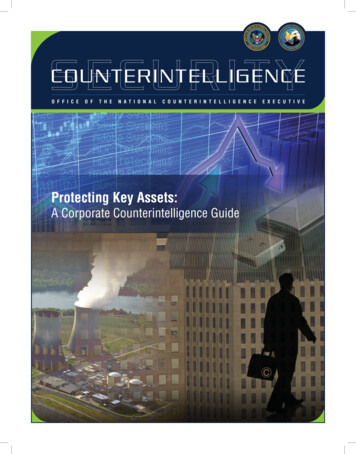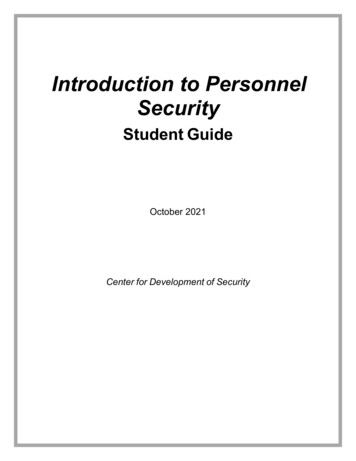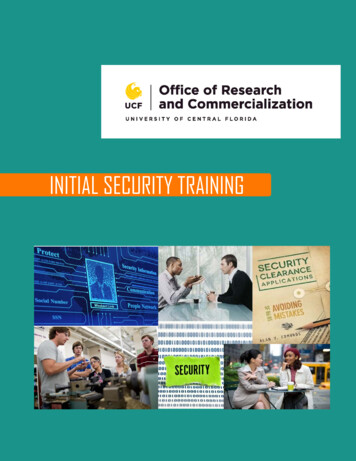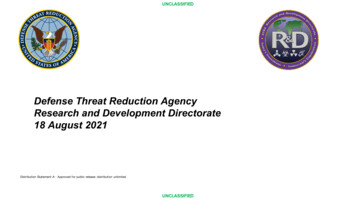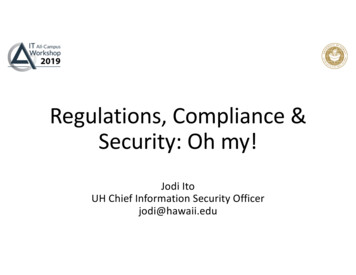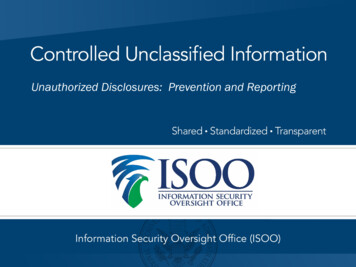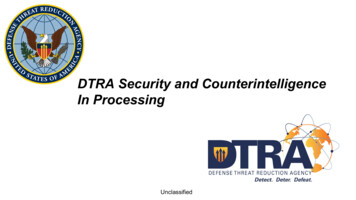
Transcription
DTRA Security and CounterintelligenceIn ProcessingUnclassified
Initial Security and Counterintelligence BriefingYour assignment to, or employment by, the Defense Threat Reduction DTRA (DTRA) carries responsibilities for safeguarding all classified andsensitive unclassified information you may come in contact with. You are responsible for helping maintain DTRA's security posture and complyingwith applicable policies. Failure to comply with the security procedures outlined within is reportable to the DoD Consolidated Adjudications Facility(CAF). Your responsibilities are covered in this briefing: ADMINISTRATIVE INFORMATION DTRA BADGE AND CACPOLICY SAFEGUARD SENSITIVE AND CLASSIFIED MATERIAL NATO/CNWDI/RD PROGRAMS MANDATORY REPORTING REQUIREMENTS/SECURITY INFRACTIONS OR VIOLATIONS/PERSONAL BEHAVIOR INSIDER THREAT PROHIBITED ENTRY ITEMS COMMUNICATIONS SECURITY (COMSEC)/OPERATIONS SECURITY (OPSEC) ACCESS TO CLASSIFIED INFORMATION SECURITY IN/OUT PROCESSING2
Administrative Information Review all information and ensure you understand before signing or accepting. All forms, brochures, contact numbers and addresses mentioned in this briefing may beobtained upon request. If you need further information or clarification, please ask yourSecurity Representative. If your duty location is off-site, your local Security Representative will provide site-specificinformation, such as evacuation locations, burn run schedule, etc. Cyber Awareness Challenge & PII training are required prior to gaining access to DTRALocal Area Networks (LAN). Print a copy of the completion certificates, and email them toyour servicing Security Office with the subject line “In- Processing Paperwork”. DTRA Policy REQUIRES you to out-process DTRA upon PCS, completion of assignment orcontract, retirement, etc. You must return all DTRA-issued items (badge, CAC, SNET token) tothe Personnel Security Office. DO NOT give these items to your supervisor, sponsor, COR, etc.You must bring them to the Personnel Security Office and officially out process. Failure to outprocess is a reportable security concern and may delay or prevent in-processing with Securityat your next duty assignment.3
DTRA Badge & CAC PolicyDTRA-issued Badges are automatically disabled after 90 days of non-use. LAN accounts are automatically disabled after 30 daysof non-use, and are deprovisioned after 45 days. More than two instances of disabling due to non-use will require a justificationfrom your DTRA Sponsor/PM/COR in order to be reactivated!WEAR the DTRA badge face-forward, above the waist, and on their outermost garment at all times within or between buildings. Neverallow other personnel to use your DTRA badge for any reason; do not allow other personnel to follow you through a checkpoint/turnstile without badging themselves in or out.CHALLENGE any individual within DTRA facilities who are not wearing a DTRA badge. Escort any individual within a DTRA facility who isnot wearing a DTRA badge, or unescorted individuals wearing a red ESCORT REQUIRED badge to Access Control.REMOVE when not inside a DTRA facility or enclosed/fenced-in area. You are accountable for your badge at all times. To avoid theft, donot leave badge unattended in your vehicle.REPORT lost or stolen issued IDs (badge/CAC/courier) in writing immediately to your site/field Security Office.PROGRAMMING of badge to special exclusion areas – Contact your local Security Manager for coordination.RETURN all DTRA-sponsored badges and IDs issued to you when Out Processing.NEVER use your DTRA badge as a form of ID outside of DTRAfacilities.4
Common Access Card (CAC)What is the purpose of a CAC? DoD Identification for access onto Military Bases Access to DoD Information Technology SystemsImportant: You will create a PIN at time of CACissue. This PIN is used for LAN access. Be sureto remember your PIN!8
How Do I Get My CAC? CONTRACTORS ONLY Personnel Security will provide you with the TASS application for a DTRA-sponsored CAC card upon receipt of your DTRA Form 3 from yoursponsor. TIPS New password must be EXACTLY 14 characters. We recommend you use your temporary password, but change the last character.You will not need to remember or use this password again. Provide the TASS temporary login and password sheet to PersonnelSecurity for destruction upon completion. DISREGARD warnings about your email address and contract number After you submit the application, your Trusted Agent will review and approve the application on your scheduled in-processing date/time. Nextyou will proceed to any RAPIDS location https://idco.dmdc.osd.mil/idco/. If on site at DTRC, you can go to the DLA CAC office. You will need totake two forms of federal, state or local government identification containing a photograph or information containing name, date of birth, gender,height, eye color and address. Personnel Security will request your UNET account when you in process. Take your CAC to the DTRA Help Desk to have DTRA certificates loaded and your .mil email address provisioned.Important: Everyone MUST Out-process with DTRA Personnel Security and return ALL DTRA Issued items. (CAC, DTRA Badges,NCR/Pentagon Badges, Courier Cards and SNET tokens)9
How Do I Get My CAC? CIVILIANS ONLY Civilians: DTRA HR will provide you with an appointment time and date for CAC issuance. Bring the CAC to the DTRA Help Desk to have certificates loaded onto the CAC Military: Once your UNET has been created (normally 24 hours after in-processing), proceed to theDTRA Help Desk to have certificates loaded onto your CAC.10
Safeguard Sensitive and Classified MaterialEach individual assigned to DTRA is responsible and accountable for handling classified information/material to prevent itsunauthorized disclosure. When removing classified information from approved storage and safekeeping, attach theappropriate cover sheet. The following three cover sheets are placed on top of documents to clearly identify the classificationlevel of the document and protect classified information from inadvertent disclosure.Classified materials must be destroyed when no longer required to maintain. Classified documents that are nolonger needed will be placed in burn bags and destroyed during the weekly burn run or by an NSA approvedcross-cut shredder. If you are not assigned to the DTRC, check with your Field Office for local procedures.Classified CDs and floppy diskettes may be destroyed by incineration. Classified CDs may also be destroyed through theuse of a device that has been identified on the National Security DTRA Evaluated Product list of the Destruction of OpticalMedia.11
NATO/CNWDI/RD Briefings*If you require accessto the SNET, you arerequired to receive theNATO briefing. NATO (COMPLETE DTRA Form 22)The NATO program is governed by the United States implementation of NATO securityprocedures (USSAN Instruction 1-70) All personnel with access to NATO confidential andhigher require a formal NATO briefing. All NATO material will be stored separately from U.S.Classified materials. The registry will control and bring under the DTRA NATO accountabilitysystem all NATO secret and above material. The registry will maintain document receipts andfiles for NATO secret and above material. All NATO transactions for NATO secret and abovewill be processed through the NATO registry (no exceptions). RD/FRD/CNWDI (COMPLETE DTRA Form 21)If your assignment at DTRA requires you to have access to Restricted Data (RD), Formerly Restricted Data(FRD), and/or Critical Nuclear Weapon Design Information (CNWDI), you are required to become familiarwith the procedures for identifying, classifying, marking, handling, and declassifying documents containingthat information as required by the Atomic Energy Act and 10 CFR Part 1045.12
MANDATORY Reportable ItemsSignificant personnel security issues may result in suspension of access or revocation of security clearance. Below is alist of items that you MUST report in writing to Personnel Security or your local Security Specialist. When in doubt,report – don’t take any chances.Foreign Travel/Foreign Contact/ForeignActivitiesAttempted ElicitationMisuse of government property or IT systemsMedia ContactsMarital StatusCriminal ConductFinancialAnomaliesAlcohol and Drug-related treatmentMental HealthReportable Actions by OthersMake the right choice – Just reportit!Please read the brochure carefully.13
MANDATORY Reportable Items, Continued Foreign Travel: Report unofficial foreign travel as soon as you are aware of the upcomingtravel.Refer to the Reporting Requirements quick link on the DTRA1 for reportingprocedures and forms. DTRA encourages you to report official travel to the Briefing/Debriefing Center. Schedule a CI Foreign Travel Briefing (via email) with the Briefing/DebriefingCenter. Unanticipated border crossings into any foreign country not included in thetraveler’s approved itinerary, regardless of duration, are discouraged. All deviationsfrom travel itineraries shall be reported within five business days of return.ForeignActivities:Report application for and receipt of foreign citizenship;application for, possession, or use of a foreign passportor identity card for travel; involvement in a foreignbusiness or organization (to include employment andvolunteering), foreign bank account, foreign property,voting in a foreign election, or adoption of a non-U.S.citizen. Schedule your Foreign Travel debriefing (via email) within 10 business days of yourreturn.Foreign Contact: Report all foreign contact. Refer to the Reporting Requirements quick link on theDTRA1 for reporting procedures and forms. Report contacts with a known or suspected foreign intelligence entity, as well ascontinuing association with known foreign nationals that involve bonds of affections,personal obligation, or intimate contact; this includes roommates, an foreign nationalwho co-occupies a residence for a period exceeding 30 calendar days, or contact thatinvolves the exchange of personal information. Schedule a CI threat briefing 30 days prior to expected official contact with foreignnationals within the U.S.Make the right choice – Just reportit!14
MANDATORY Reportable Items, Continued Attempted Elicitation:Report any actual or attempted exploitations, blackmail, coercion, or enticement to obtainclassified information or other information specifically prohibited by law from disclosureregardless of the means used.Misuse of Government Property or IT Systems:Report any actual or suspected unauthorized access or use of IT systems. Viewing, transmitting,or soliciting sexually oriented material or images; transmitting profane, obscene, abusive,offensive, or harassing statements is strictly prohibited. (see DTRA FM 205 for further information)Media Contacts:Any release of DTRA information, to the media or otherwise, must be approved through the DTRAPublic Affairs Office. You must report any other contact with or solicitation from the media even ifthe contact does not result in an unauthorized disclosure. If any member of the media contactsyou for information, refer them to Public Affairs; never comment on news releases pertaining toDTRA or classifiedinformation.NO PORN!Change in Marital StatusReportable changes in status include marriage, intent to marry, legal separation, divorce, andcohabitation that involves living with and sharing bonds of affection, obligation or othercommitmentMake the right choice – Just reportit!15
Mandatory Reportable Items, Continued Reportable Actions by Others:Your obligation to protect national security includes reporting any of the above behaviors known or observed in othercleared personnel, as well as any unwillingness to comply with rules and regulations or to cooperate with securityrequirements, unexplained affluence or excessive indebtedness, alcohol abuse, illegal drug use/activity, criminalconduct, misuse of government property or IT systems, mental health issues where there is reason to believe it mayimpact the individual's ability to protect classified or sensitive information, and any activity that raises doubts as towhether the individual's continued clearance eligibility is clearly consistent with the interests of national security.Security Executive Agent Directive 3When should I report: ASAPReport information as soon as you plan, become involved in orprior to participation in an activity.If unable to report immediately, you should report to PersonnelSecurity within 24 hours of an event.Make the right choice – Just reportit!16
Security Infractions and Personal BehaviorREPORT ALL SECURITY INFRACTIONS AND VIOLATIONSImmediately report all security violations, security infractions, or practicesdangerous to security to your Security Manager and to DTRA Securitypersonnel.PERSONAL BEHAVIORYou must exercise vigilance, caution, and discretion in your personal conduct to avoidbeing placed in compromising situations.Be wary of anyone attempting to befriend you for no obvious reason or involve you in aromantic escapade. Such tactics have frequently been employed by foreign intelligenceservices.17
Insider Threat Insider threats exist in DTRA and it is everyone’s responsibility to helpsafeguard our information, facilities, and personnel Not all insider threats are intentional! A great deal of technologyandinformation is lost because of carelessness Report anything of concern; our team will direct to the appropriateoffice18
Reportable IndicatorsReportable indicators of suspicious behaviors include, but are not limited to: Attempting to expand access for duties beyond normal responsibilities Displaying questionable loyalty to US government Performing repeated or unrequired work outside of normal duty hours Exhibiting behavior that results in repeated security violations Engaging in illegal activity or asking you to engage in any illegal activity Attempting to elicit personnel with access into compromising situations Changes in financial circumstances:- Displaying unexplained or undue affluence- Sudden repayment of debts, bragging of money Exhibits actions or behaviors associated with disgruntled employees:- Conflicts with supervisors and coworkers- Decline in work performance- Tardiness- Unexplained absenteeism19
Why Co-Workers Might Not Report Didn’t consider the activity important enough to take action Didn’t recognize observed behavior as suspicious or athreat Didn’t want to be identified as a “tattler” Didn’t know how to report the suspicious behavior20
How Employees Can Contact UsWhen reporting on the tip line on DTRA1, you can choose to remain anonymousContact Us:Email: @mail.milDTRA1 Portal: https://dtra1portal.unet.dtra.mil/OI/MS/Insider Threat/default.aspxRoom: 1400Telephone: (571) 616-6123 or (703) 767-485321
Prohibited Entry ItemsCameras, weapons, wireless devices, smart watches, and other portable electronic devices are notpermitted within DTRA spaces without express written permission or waiver. Prohibited electronicdevices include both personal and government- issued devices, to include smartphones, e-readers,tablets, laptops, unapproved smart watches and similar devices. DTRA UNET laptops and approvedmedical devices are exempt from this policy. Certain personal wearable fitness devices are permittedwhen they appear on the approved devices list; however, connecting to DTRA systems or networksis prohibited. DTRA may conduct random searches at any time to confirm policy compliance.Wireless detection equipment will be used to monitor compliance with thispolicyNo electronic devices, personally or government owned, are permitted in any DTRASCIFwithout written approval from the Special Security Officer(SSO).Wireless devices are prohibited for use within all DTRA facilities.Personnel who do not wish to leave their wireless device in their vehicles, may store them in thelockers provided in the main lobby of the DTRC or similar storage lockers at other DTRA facilities.Wireless devices must be turned off prior to entering DTRA facilities and placed in the locker. Theselockers are provided as a courtesy for day-use only; do not take the key to the locker home with you.22
Unauthorized DisclosureDiscuss classified information only with those who have the appropriatesecurity clearance and a valid need-to-know. Verification of need-to-know restswith the person who controls the information. When in doubt, do not divulgeinformation. Remind recipients of the classification of the information you areabout to discuss. Do not comment on any news releases pertaining to DTRA.If contacted by the media or general public, refer the caller to Public Affairs,703-767-5870.If contacted by the media outside of normal duty hours, refer the caller to703-767-2003, who will notify Public Affairs.Please do not comment.23
COMSEC and OPSEC AwarenessCOMMUNICATIONS SECURITY (COMSEC)AWARENESSUse of the duty phone constitutes consent to COMSEC monitoring. Never discuss classified informationover standard duty phones and do not attempt to “talkaround” classified information. Use your HOLDbutton when calling someone else tothe phone or when assisting a customer. Do not fax classified materialusing anunclassified fax machine and do not use a fax machine as a copier.OPERATIONS SECURITY (OPSEC)AWARENESSWhile we have traditional methods to protect classified information, we also deal with unclassified but sensitiveinformation that, if revealed, could expose areas where DTRA could be vulnerable. Be familiar withsensitive unclassified information and be aware of to whom you revealthis information. If in doubt, do not reveal it.No office paper, regardless of classification and/or sensitivity will be disposed of in a trash basket, garbage can,dumpster or recycle bin. All office paper will be placed in a burn bag for centralized destruction or shredded.Office paper is defined as paper items containing either computer-generated or hand-written print; this includes,but is not limited to printer paper, notebook paper, post-its, scratch pads, calendar sheets,etc.24
Security ClearanceA security clearance is a privilege, not aright.When you accept the privilege of havingaccess to classified and sensitive information,you also accept the responsibilities thataccompany this privilege.This is a lifelong responsibility.27
Access to Classified InformationRequirements for Access to Classified Information:As an employee of the U.S. Federal Government or one of its contractors, licensees, or grantees in aposition that requires access to classified information, you must:1.Possess a valid Security Clearance (Eligibility)You have been the subject of a personnel security investigation to determine your trustworthiness foraccess to classified information. As an individual who has been granted a security clearance(eligibility), you have met the first of three requirements necessary to have access to classifiedinformation.28
Access to Classified InformationRequirements for Access to Classified Information:1.Possess a valid Security Clearance2.Have an official “Need-to-Know”The holder of classified information determines Need to Know.Need to Know is based on a requirement for access to, knowledge of,or possession of the classified information in order to perform tasks orservices essential to the fulfillment of an official United States Governmentprogram in the interest of national security.Access to classified information shall not be afforded to any individual solely by virtue ofoffice, position, or security clearance.29
Access to Classified InformationRequirements for Access to Classified Information:1. Possess a valid Security Clearance2. Have an official “Need-to-Know”3. Signed SF 312 Nondisclosure AgreementThe SF 312 is a contractual agreement between the U.S. Government and you, a cleared employee, in whichyou agree not to disclose classified information to an unauthorized person. Its primary purpose is to informyou of your responsibilities to protect information and the consequences that may result from your failure tomeet those responsibilities.30
SF 312 Overview I accept the obligation contained with the agreement.I have received a security indoctrination and a I understand my responsibility to protect classified information.I have been advised that unauthorized disclosure of classified information could result in damage to national security.I understand that I must comply with the laws protecting classified informationI understand that a breach of the agreement could result in: Termination of my clearance Transfer from my position Termination of my employment Criminal ProsecutionAny benefits, financial or otherwise, that I receive from the unauthorized disclosure of classified information will be given to the U.S.government.I understand classified information belongs to the U.S. government and not to me.I will return all classified materials to the U.S. government whenever I no longer need them.All my questions have been answered and I have been offered access to theExecutive Order 13526 and statutes referenced in this agreement.Contractors/Non-staff: you signed the SF 312 with your owning organization/company.Military and Civilian Staff Member employees will sign the SF 312 prior to their first day.31
Initial Security and CounterintelligenceBriefing CertificateBE SECURITY CONSCIOUSA successful security program begins with each individual. Security needs your assistance daily to ensure that bothclassified and sensitive unclassified material is protected. Working together, we can make a difference.SIGN AND DATE THE INITIAL SECURITY AND COUNTERINTELLIGENCE BRIEFINGCERTIFICATE (DTRA FORM 120).Do you hereby accept the obligations as described above and as contained in the Initial Security andCounterintelligence Briefing? If yes, please do the following:Step 1. Sign and Date the DTRA Form 120 Initial Security and Counterintelligence Briefing Certificate.Step 2. Email to (HQ) qc@mail.mil(Reston) il.mil(ABQ) bq@mail.mil(Travis) dtra.travis.oi.list.oi-msct-security@mail.milIf you have a CAC, you may digitally sign the DTRA Forms 120 and 205. You may only exercise this option if you have aCAC. All others must sign the documents by hand.32
LAN Access User Agreement Read pages 1-5 of the DTRA Form 205 LAN Access UserAgreement Sign the agreement on page 1.Step 1. Sign and Date the DTRA Form 120 Initial Security and Counterintelligence BriefingCertificate.Step 2. Email to (HQ) qc@mail.mil(Reston) il.mil(ABQ) bq@mail.mil(Travis) dtra.travis.oi.list.oi-msct-security@mail.milIf you have a CAC, you may digitally sign the DTRA Forms 120 and 205. You may onlyexercise this option if you have a CAC. All others must sign the documents by hand.33
Cyber and PII Training All new civilian employees, service members, and contractor/non-staff personnel must completethe below mandatory training requirements prior to arrival at DTRA. You may complete alltraining online using your personal computer. New Cyber Awareness Challenge (Department of Defense Version)Personally Identifiable Information (PII)Step 1. Print a copy of the completion certificatesStep 2. Email to (HQ) qc@mail.mil(Reston) il.mil(ABQ) bq@mail.mil(Travis) dtra.travis.oi.list.oi-msct-security@mail.mil If you experience a challenge printing the certificates, you may capture a screen shot of thecompletion certificate and print the screen shot. Note: You are not required to re-take the training if you have training certificates dated within thelast calendar year34
Passing Your ClearanceWhen you are attending a meeting/conference and need to pass your security clearance to anotherorganization:CIVILIAN AND MILITARY ONLY (Company Facility Security Officer (FSO) must pass contractor clearances): Submitan outgoing visit notification to Visitor Services via the CRC x35
Visitors to DTRAWhen you are sponsoring outside visitors to DTRA:Whether you are hosting one, two, or 50 visitors, you should use the Visitor Notification System to let VisitorServices and Access Control know you are expecting people from outside DTRA.Submit notification via the DTRA1, in the Customer ResponseCenter (CRC), under Security.Visitor Services will notify you if further information is requiredand will send you a confirmation when all necessary actionsare completed.Remember all Foreign visits MUST be coordinated with theForeign Disclosure Office36
Remember: IT’S POLICY!All personnel in the below two categories must out process through Security:1. Terminating employment, retirement, reassignment to another governmentagency2.Any absence from duty or employment that exceeds 60 days. (DTRA badge and LAN will be disabled at 30 and 90 daysrespectively; plan in advance with Security if you know you’ll be out of pocket for that period oftime)Individual Responsibility:If you will be leaving DTRA, notify Personnel Security by completing the Out Processing Notification located on the DTRA1in the Customer Response Center (CRC).Please get started a few days before you plan to leave so that all government/DTRA property is returned andaccountssettled before your departure date. You must complete the majority of your out-processing prior to your actual day of departure.YOUR LAST ACTION WILL BE SECURITY IN/OUT-PROCESSING. You must turn in all DTRA issued badges, Token, IDs, etc. DO NOT turn in yourDTRA-issued badge or CAC at your company or leave them with anyone; they are the property of DTRA Security and MUST be returned to DTRASecurity at the time you out process.Any exceptions to the above process must be pre-coordinated with Security In/Out Processing by Supervisor/COTR or Security Manager.Failure to out process may adversely affect your security clearance with another location orposition.37
Your First DayEnsure your government sponsor has requested an in-processingdate/time for you with Personnel Security (Mil and Contractor/NonStaff es/Home.aspx*Military personnel must check in with Military HR prior to inprocessing with Personnel SecurityEnsure you have emailed the below documents in advance:1. Cyber Security Awareness Training Certificate (dated within the lastcalendar year)2. Personally Identifiable Information Training Certificate (dated within the last calendar year)3. Signed DTRA Form 1204. Signed DTRA Form 20538
Questions?Email any questions you may have to: qc@mail.milWELCOME TO DTRA!39
Cyber Awareness Challenge & PII training are required prior to gaining access to DTRA Local Area Networks (LAN). Print a copy of the completion certificates, and email them to your servicing Security Office with the subject line "In- Processing Paperwork". DTRA Policy REQUIRES you to out-process DTRA upon PCS, completion of assignment or

